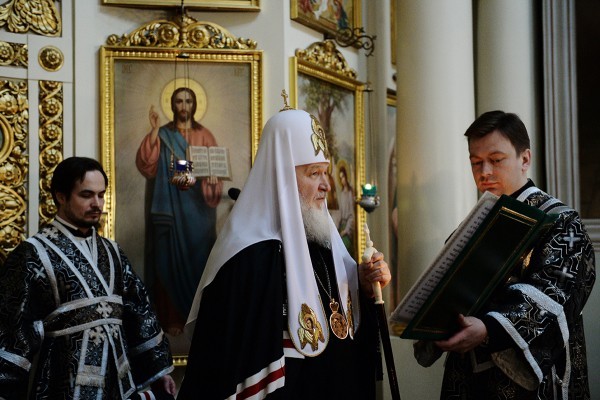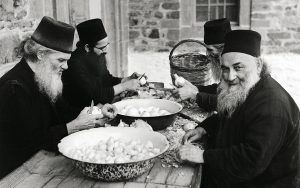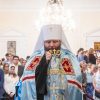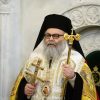Reverend Father Alexy, Superior of this holy monastery! Dear Fathers, Brothers, and Sisters!
I would like heartily to congratulate you all on the beginning of the saving days of the Holy Forty Days. The Lord gives us this time so that we could, in the first place – in solitude, in prayer, and through abstinence – come to a better understanding of ourselves.
Self-knowledge is one of the most important goals of Great Lent. It is quite difficult to understand ourselves, because we are different at every moment of our lives. This difference is influenced by exterior conditions, as well as by the devil’s temptations. That which seemed impossible and unacceptable yesterday, is today accomplished with ease. And, on the contrary, sometimes the following day helps us understand more, to see more in ourselves, and to repent of our sins.
That is why, apart from self-knowledge, during the time of Great Lent, self-control is also required. During usual times, we hardly control ourselves. We do not control merely our words and deeds, but even our thoughts. If Great Lent leads us to this skill – the skill of controlling our thoughts – it means the fast was not in vain for us.
But even self-control is not enough. All this serves to educate ourselves. Therefore, self-education is something that should certainly accompany the arena of the fast.
The achievement of these three goals will have an altogether beneficial and positive effect on the human soul.
We find extraordinary words in the writings of St. Mark the Ascetic, who said that fasting can lead not merely to good, but also to evil. Indeed, by entering the arena of the Holy Forty Days, and by imposing upon ourselves certain labors and undertaking these labors, we come into a zone of special danger: that of self-exaltation and vanity, especially if we compare ourselves with other people, not merely with non-churchly people, but also with our churchly brethren. Vanity, which can sometimes develop from a strict fulfillment of the fast, is a bitter, dangerous, and poisonous fruit of fasting, as St. Mark puts it. Just as we open our souls to spiritual food when we do not eat food, so too when we do not accompany our fast with self-education, control, and self-knowledge, we are capable of letting the devil into our souls, who can transform our good deeds into evil.
Therefore, the time of the Holy Forty Days is a time of struggling with ourselves. We immerse ourselves in a special atmosphere, which is beneficial for accomplishing spiritual ascetic struggles. When a rural lifestyle dictated the pace of life and behavior of most people, the fact that Great Lent fell in late winter or early spring, implied that peasants did not have any special cares. It was too early to begin preparations for planting, and people did not have anything special to do. That was the reason why our righteous ancestors, who lived in accordance with that rhythm of rural life, devoted their time to the fast by attending divine services and through prayer, differing little from monks. It was during this time that our monasteries were filled with an enormous number of pilgrims.
Today people’s lives have changed dramatically. The rhythm of life, including the rhythm of work, does not differ from ordinary days during Great Lent. And it is incredibly difficult for a person to concentrate amidst this everyday whirl of events, while being immersed in solving a multitude of questions and issues, which have no connection with the spiritual life. This is why we encourage our faithful, who are members of our Church, and who live such a life against their will, who have certain duties, and do not have the opportunity to spend time in solitude, to try to come to God’s church as often as possible. It is because here, in God’s church, grace and prayer are present. If you do not have the strength to pray, someone next to you is praying with you. And God’s grace, which is sent to one of fervent prayer hidden from your view, touches you due to his ascetic struggle.
That is why even an unchurched person feels something special when he enters a church. He understands that there is another reality there, without which it is impossible either to control, discover, or educate oneself. Therefore, attending divine services during Great Lent is the only opportunity to touch the rich spiritual experience of the Church and God’s Grace to the extent of one’s strength and situation.
Of special significance are our monasteries, where monastic communities gather. During these days, a special responsibility for prayer falls on you, dear monastic brethren.
Pray for yourself, test your conscience, control your thoughts, but at the same time pray for the world – for those people who are beyond the monastic walls and do not have the opportunity to spend the days of Great Lent in the way you can.
Pray for our Fatherland and for the entire world, that the Lord would put a stop to the spread of evil in this world, lead people away from the heavy burden of various temptations and lures, and open before them the great prospect of eternal life.
This prayer of monks for the entire world has a great meaning, even without naming names. Be especially attentive to those who will come to you to for Confession. Help them to find their way to God, if they have not yet found it, and strengthen them on this path, if they have already taken it. Be merciful and loving, combining sound words of teaching with patience with people.
During Great Lent, help many see the loving image of the Church, because the Church can have no other image, and because this image reflects the loving Image of the Savior Himself.
May the Lord strengthen everyone at the place of their obedience to go through the field of the Holy Forty Days worthily. Amen.
Translated from the Russian by Maria Trushanina




















